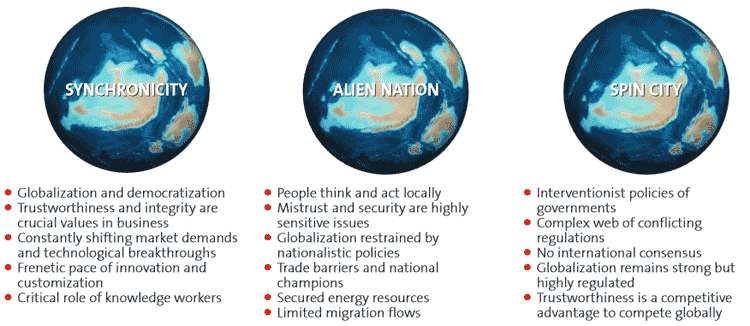This is an experiment of sorts, as I am seeing if I have enough material and insight to tie several geopolitical developments together with the supply chain into a worthwhile column.
If you are reading this now, I guess that means I managed to pull it together, at least in my own mind.
Gilmore Says: |
 China looks positively buoyant compared to once high flyers like Brazil, Turkey and Russia, which are now growing less than the US. Companies are recalibrating business and supply chains strategies in this new "new normal." China looks positively buoyant compared to once high flyers like Brazil, Turkey and Russia, which are now growing less than the US. Companies are recalibrating business and supply chains strategies in this new "new normal."

Click Here to See
Reader Feedback |
The immediate trigger is Russia's taking over Crimea from Ukraine, and threatening to go a lot further. If you believe this is all just geopolitics and doesn't really impact the supply chain, think again.
In my view, the world in 2014 is getting a lot more scary and risky for business and supply chain. That in turn reminds me of something that came out of MIT's "supply chain 2020" initiative that ran for a few years, starting about 2005.
I am not sure if we ever got a full report on the 2020 supply chain out of that effort, but one thing struck me early on - the obvious but at the same time useful observation that the supply chain of the future is heavily dependent on the world of the future, the business and political environment the supply chain will operate in.
MIT described three broad potential states, as shown in the graphic below. We could have "synchronicity" - a peaceful, safe world with minimal armed conflict, largely open and free trade, etc. At the other end of the spectrum is an "alien nation" environment, where conflicts are many, regionalism trumps globalism, and world trade is heavily restricted. In between we have "spin city", better than alien nation, but far from an ideal supply chain environment.
Think our supply chain strategies and networks would look different under each scenario? You bet.
So which category would you put the world in now - and where do you think it is headed? That is the trillion dollar bet. Me? Spin city, but trending the wrong way.
MIT's Supply Chain 2020 Global Scenarios

An essay and then book in the late 1980s by Francis Fukuyama titled "The End of History" basically postulated that with the collapse of the Soviet Union, Western, democratic and largely capitalist ideas had triumphed, and that we were now entering into something like a synchronicity era. And for about 17 years, through 2007, that was arguably the case, though terrorism/9-11 was a development Fukuyama did not foresee and maybe was a harbinger of more stresses and tensions to come.
Not surprisingly, world trade exploded, and companies and their supply chain's became global in nature, in incredibly rapid fashion, if you think about it. The world looked flat indeed, in a nod to Thomas Friedman's influential book.
But then came the financial collapse, causing severe new global strains that have not gone away. Now Russia invades a part of Ukraine, China is aggressively claiming ownership of vast swaths of Pacific land, air and sea, there is never ending tumult in the Middle East and more. Anyone feeling synchronous about the world right now?
And thus not surprisingly, global trade volumes are shrinking - significantly so. Six years after the financial crisis, that is actually quite strange and worrisome.
Last year, global trade is believed to have grown just 2.5% - lower than global GDP growth. Think about that - it is quite astounding, in this global era. Leading up to the 2008-09 recession, global trade growth was routinely two times the rate of global GDP growth. We are seeing a significant slowdown in cross border trade, and far from all of it caused by the never ending slump in Europe.
Maybe Maersk should send back a few of its new fleet of 18,000-TEU Triple E vessels.
Here is what FedEx founder Fred Smith said at a conference just earlier this month: Even a modest rise in trade in the years ahead is unlikely without "a decisive change in direction by governments around the world."
"Last year, the top 20 world economies passed 23% more protectionist measures than in 2009," he added. Are we drifting towards "alien nation?"
This of course is then not unrelated to the dramatic slowdown in emerging market economies - just as so many Western companies are betting large chunks of their future on capturing what looked like dramatic growth opportunities there. The growth target in China is down to 7.5% for 2014, from 10% or so for many years, and many believe actual growth outside the official numbers will be much less. This has caused many commodity prices, noticeably metals, to plummet.
But China looks positively buoyant compared to once high flyers like Brazil, Turkey and Russia, which are now growing less than the US' modest growth. Companies are recalibrating business and supply chains strategies in this new "new normal."
So against this rosy backdrop consider the following:
• If Russia decides the Crimea annexation was enough, that situation probably settles down quite a bit. However, if Putin sends troops into Eastern Ukraine, we are back to something like the Cold War paradigm. This would inevitably have an impact on GDP growth globally and especially in Europe. If sanctions are placed on Russia, this could lead to high trade barriers and even confiscation of Western company assets. Those like Pepsico, Coca-Cola, some US and German automakers and more that have major assets or sales in Russia would be at huge risk.
That would also lead to concerns about actions/pressure from Russia further west, and cause companies second thoughts about sourcing from Eastern European countries such as Poland, a recent trend.
Just yesterday, after I started writing this, former US Secretary of Defense Robert Gates wrote in the Wall Street Journal that Putin's actions "challenge the entire post-Cold War order."
• As we just discussed with former UN Ambassador John Bolton, China's increasing claims over huge areas in the South China Sea and beyond could be taken to the next level. That could mean either real shooting with countries such as Japan, the Philippines, South Korea and more, and/or those now international and heavily trafficked waters being turned into what Bolton called "a Chinese lake." Neither path would be good for supply chains, to say the least.
A new book by Robert Kaplan on what is going on there says China views the vast region as "blue Chinese soil," where it has "indisputable sovereignty" despite international law. Meanwhile, the threatened Asian countries are rapidly adding military capabilities in response "in one of the most under-reported stories in the elite media in decades," Kaplan says. Doesn't augur well for future peace.
• And of course, there is still the very real threat of Israel taking out Iran's nuclear capabilities. That would send oil prices soaring, and likely trigger a global recession, depending in part how the Iranians respond. Hasn't happened yet, but the odds to me are far from small.
So there you have it. Don't get me wrong, there are some positive signs across the globe right now too, but a misplay soon by Putin could negate a lot of that.
As always, the key is scenario planning - if any of these things occur, what will be the impact on your business and your supply chain, and how can those risks be mitigated? You need answers to those questions soon if you have not already done so. The exercise is simply an imperative.
I don't know about you, but I am just not feeling much synchronicity right now. It is certainly not the end of history, that is for sure.
What are your views of where the global geopolitical environment is headed? Are you concerned? Let us know your thoughts at the Feedback section
below.
|